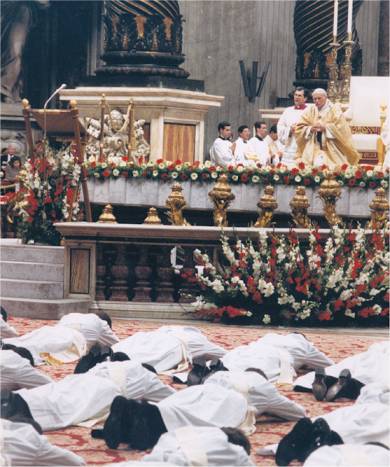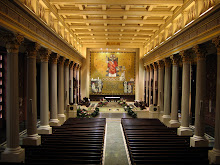Before going any farther, if you haven't done so, check The Call series at Columbus Dispatch. Today concludes a weeklong series, which has been pretty good.
A reader asks:
Father, a number of us were discussing the time in the seminary. As I understand it the time in training is 6-7 years. Is that correct? Is it the same as it was time wise back in the 50's?
It seems like today we get so many who have college degrees and life experience when back in the 50's we had kids coming in from high school (ed's note: if not directly from 8th grade!). Is that not correct? If so, why can't we get this training done a lot faster? Seems like with the shortage, we could use some priests out here and a shorter training time might also encourage someone to become a priest who has interest. I can't imagine going through college and then taking on that many years of training to become a priest. However, I leave it to the church to decide as they certainly know far more than I do.
When asking questions of this type, I think the last line is certainly the most important: The Church does indeed know better than I do, even me as a priest, and we do not just submit to her authority, but seek to understand why she teaches or practices such a thing.
To answer the actual question, one must turn to The Program for Priestly Formation by the USCCB, 5th Edition. This is the document tha tguides seminary formation in this country, and implements the vision that was set out by Pope John Paul II in Pastores Dabo Vobis (I will give you shepherds). It was published in 2006, right as I was beginning in the office. This document sets out the requirements that all seminaries have to follow.
The actual time in 'Major Seminary' is the same today as it was in the 50's: four years. However, there is a new phenomenon that did not exist 'back in the day:' second career vocations to the priesthood. (They always did exist, just not in the numbers we see today.)
What the Church has found is that while these men do bring a treasure of experience from a working career (even some having been married and widowed), there is a great need to form them in the Christian environment. The fact is, we live in a post-Christian world, and whereas in the past, men being formed in seminary had eight to twelve years of formation, through high school and college to focus on Christian classics, a true Liberal Arts education, a strong foundation in philosophy and literature, these dimensions are missing when a man comes through with an engineering degree, or a finance/business degree; even with a teaching degree. Hence, seminaries have set up 'Pre-Theology' programs that address the needs to form these second career men in this Catholic world view before they begin their theological studies.
The PPF stipulates that in order to enter 1st Theology, one must have completed 2 years of formation to get a groundwork and set a basis to prepare that man to study theology, hence for a man that has a degree elsewhere, he must do 2 years 'remedial study' before completing the 4 years of theology. Some dioceses and/or seminaries also require a year of internship/pastoral year (we do), which adds another year to formation, hence the guys that enter Pre-Theology I for us this fall can expect a 7 year formation program. Yes, it is alot, yes it is daunting. But as I explain what is all involved in semianry formation (much more than just academics), the time seems to be not near enough for what a man has to do, personally, professional, spiritually, to take up the mantle of the priesthood.
The heart of your question, while I think well intentioned, also shows something deeper. Please do not take this the worng way, but it seems that you see the priesthood as a mere sacramental machine. (I know many others that, while good hearted, fall into this approach.) 'If the training were shorter, we would have more priests.'
To that I ask: 'Do you want more priests, or do you want holier priests, better priests, excellent priests?' To get the latter, even seven years is not enough, and bluntly, that's what we need. Not more, holier.
Friday, August 28, 2009
Subscribe to:
Post Comments (Atom)










5 comments:
Amen.
The left-wing view actually wants to demote priests to being sacramental Pez-dispensers (not saying that the person asking the question holds that view.) WE want HOLIER, better formed priests!
We go to our priests for far more than just the Sacraments!
I think the flip side to the questions 'do you want holier priests?' - which is obviously yes) is 'Does the current seminary approach produce holier priests?'
The number of years in seminary (5 or 6 or 7) or taking more classes doesn't necissarily imcrease holiness. We do need well intellectually formed priests with the knowledge to do the day to day work that is required for the role. For this - a basic amount of classes and time are required.
A dose of the 'real' world is good - hence the intern year - BUT does this year REALLY provide seminarians with this AND help them grow in holiness?
So - I think the real question is - is the currect execution of Pastores Dabo Vobis in the US Seminaries the right one?
If you have previewed the NYPriest.com trailer, wow! Ordination is God's doing! This is a gift from God, not an earned trophy! I too feel, even as a lay minister in parishes, I have not spent enought time learning what God has for my life. I certainly don't think seminarians aren't any different. Bring on the holier, better priests!
Thank you very much for taking the time to answer my question. In response to the end, never fear my taking anything from you the wrong way as I have respect for all you are doing in your critical service.
It is the age old question, do you want quantity or quality. My answer to this is always both. I think the point made in the comment above is what is the results of the additional time and a second quesion is also what is the result of not making a change to get more priest in some faster manner? What is the time required for deacons who come from that same second background and increasingly take on many roles in the same parishes? What would be the impact of having a priest out two years sooner versus having a deacon? What is the time required of a deacon?
Also, what exactly can the deacon do in the parish. Is there somewhere one can find this well spelled out? What can they do during the mass with the priest? What sacraments can they administer without the priest there? Frankly I am not a big fan of the deacon program and wonder at the numbers now seen in some dioceses who seem to have very low priestly vocations.
Thanks for this very interesting post. I had never stopped to think about the educational and religious deficits facing someone coming to priesthood later in life. I understood Greta to mean that, as older men are more mature than young adults, perhaps they didn't need as much school. But I can see why they do!
Post a Comment